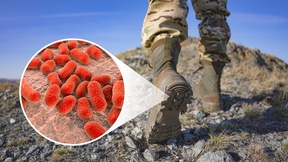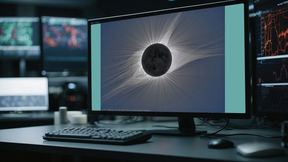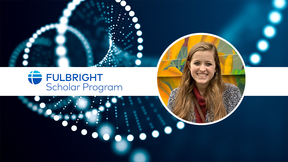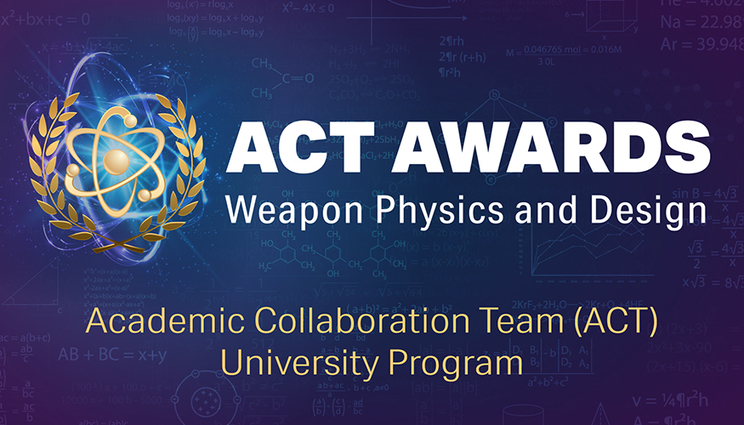Six Lab scientists partner with university researchers through WCI’s ACT Awards
Six scientists at Lawrence Livermore National Laboratory were recently granted awards through the Lab's 2022 Academic Collaboration Team (ACT) annual call for proposals. Now in their fourth year, ACT university collaboration awards were created to encourage and advance strategic partnerships among universities with a focus on the Lab’s and Weapons and Complex Integration’s mission.
The awards emphasize key outcomes, including innovation and basic science, to establish long-term relations with universities to respond with agility to the Lab's Weapon Physics and Design and Weapons Simulation and Computing/Computational Physics Program challenges.
The 2022 call, led by physicist Luc Peterson, was the most competitive call on record. Winning proposals were selected for their innovative scientific ideas with high potential for impact on Laboratory programs. The awards represent a wide range of Lab-relevant science, ranging from particle transport in flows to carbon chemistry in shocked materials.
Award recipients include: Kambiz Salari, Daniel Siefman, Daniel Taller, Sorin Bastea, Robert Nourgaliev and Pierson Guthrey.
Another call for ACT university collaboration proposals was recently announced and is expected to be a draw for scientists across the lab.
“The ACT call for proposals is a great opportunity for both professors and Lab scientists,” said team chair Alison Saunders. “Because awards can fund a university for up to three years, awards often support a graduate student through the bulk of their Ph.D. research. This means we can have a real impact on a student’s career and work collaboratively with a university for an extended period of time.”
ACT has been led by Rose McCallen and administered by Kim Rivera since its inception in 2018. McCallen recently stepped down as the chair and Saunders was selected to lead the team.
“I’m very grateful for this opportunity to work on behalf of the Lab in support of its strategic academic collaborations,” Saunders said. “Rose, Kim, Luc and all the committee members did a fantastic job in building this program to what it is today.”
Scientists interested in submitting proposals to the current call or in learning more about university collaborations are encouraged to speak with previous awardees or Alison Saunders (ACT [at] llnl.gov (ACT[at]llnl[dot]gov)).
2022 Awards
This year, the awards total $700,000 per year for three years and are distributed to six universities. This year’s recipients, project titles and LLNL and university principal investigators are as follows:
Texas A&M (TAMU)
Development of impulse diagnostics and ejecta measurements for particle interaction with metal and composite surfaces
Kambiz Salari, LLNL principal investigator
Tom Lacy, TAMU principal investigator
Waruna Kulatilaka, TAMU co-investigator
Sydney Davis, TAMU Ph.D. student
Khari Harrison, TAMU Ph.D. student
University of Tennessee Knoxville (U of T)
Pulsed neutron and gamma flash experiments in beryllium
Daniel Siefman, LLNL principal investigator
Vladimir Sobes, U of T principal investigator
Rida Rahman, U of T Ph.D. student
University of California Davis (UCD)
Multi-particle transport in a complex flow field with surface impact
Daniel Taller, LLNL original principal investigator (K. Salari currently serving as acting PI)
Seongkyu Lee, UCD principal investigator
JP Delplanque, UCD advising
Jessica Shum, UCD Ph.D. student
University of Michigan (UM)
Enabling a quantum accurate description of chemistry and carbon condensation in shocked organic materials
Sorin Bastea, LLNL principal investigator
Rebecca Lindsey, UM principal investigator
North Carolina State University (NCSU)
Development of a moving discontinuous Galerkin method with interface condition enforcement (MDG-ICE) for compressible viscous flows
Robert Nourgaliev, LLNL principal investigator
Patrick Greene, LLNL co-investigator
Hong Luo, NCSU principal investigator
Gianni Absillis, NCSU Ph.D. student
Michigan State University (MSU)
High dimensional kinetic simulations enabled by tensor-train based discretizations
Pierson Guthrey, LLNL principal investigator
Frank Graziani, LLNL co-investigator
Michael Murillo, MSU principal investigator
Contact
 Michael Padilla
Michael Padilla
[email protected]
(925) 341-8692
Tags
Advanced Materials and ManufacturingMaterials Science
Physical and Life Sciences
Strategic Deterrence
Careers
Featured Articles








